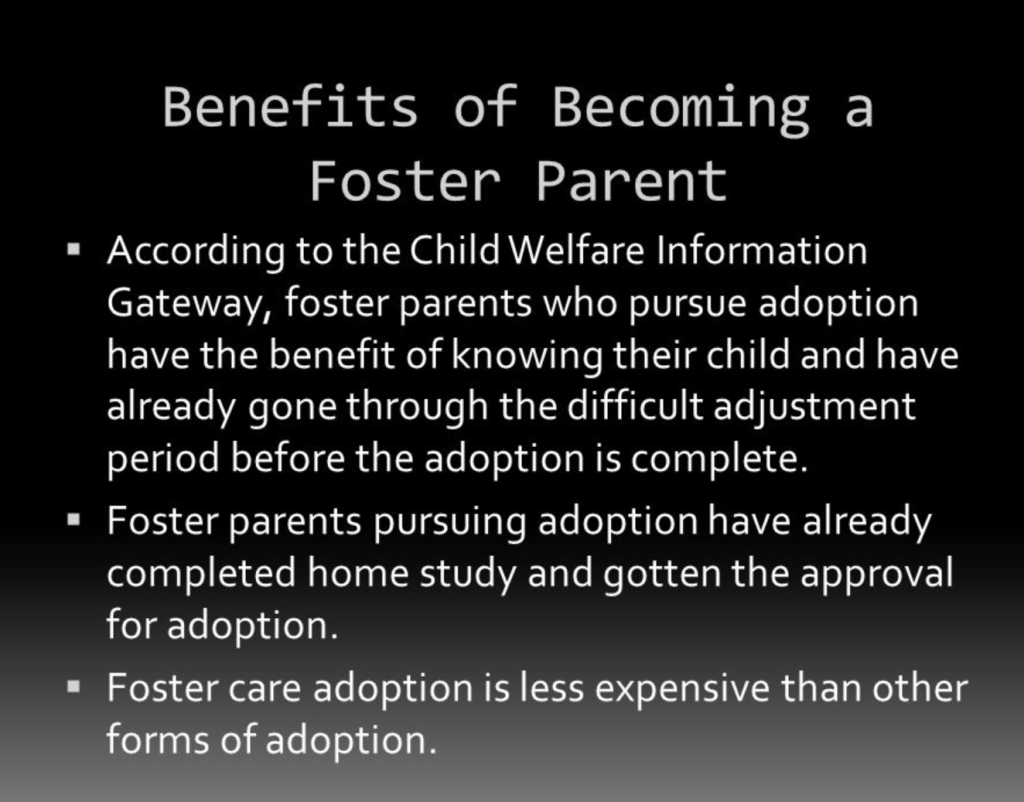The Many Rewards of Being a Foster Parent
Foster parenting is a noble endeavor that has the power to change lives, both for the children in need and for the caregivers who open their hearts and homes. In this article, we’ll delve into the rich tapestry of rewards that come with being a foster parent. From emotional fulfillment to creating positive change and opportunities for learning and growth, fostering is a journey filled with numerous benefits.
Emotional Fulfillment
One of the most profound rewards of being a foster parent is the emotional fulfillment it brings. When you provide a safe and loving home for a child who has experienced hardship, you become a source of comfort and stability in their life. The joy of watching a child’s confidence and happiness bloom under your care is immeasurable.
Embracing the Journey: Foster parents often share heartwarming stories of the emotional bonds they form with the children they foster. These connections, built on trust and love, provide a sense of fulfillment that resonates deeply.

Creating Positive Change
Foster parents are instrumental in creating positive change in the lives of children who have faced adversity. By offering a stable and supportive environment, you empower these young souls to overcome challenges and reach their full potential. The transformation you witness is a testament to the impact you make.
A Brighter Future: Success stories of children who have thrived under the care of foster parents are truly inspiring. It’s a reminder that every act of kindness and every nurturing gesture contributes to a brighter future for the children you foster.
Learning and Growth
While foster parenting is primarily about giving, it’s also a journey of personal growth and learning. The experiences gained from fostering cultivate valuable qualities such as patience, resilience, and adaptability. It’s a path that fosters not only the development of the child but also the foster parent.
A Lesson in Resilience: Foster parents often find themselves facing unique challenges, which in turn, strengthen their resilience. These experiences can lead to personal growth and a deeper understanding of the human capacity for compassion and care.
Expanding Your Family
Foster parenting has a unique quality—it has the potential to expand your family in ways you may not have anticipated. Beyond providing care, many foster parents develop profound connections with the children they foster. These connections often lead to the decision to make the child a permanent part of their family through adoption.
A Growing Bond: The relationships formed during foster care can be incredibly strong. Foster parents who decide to adopt their foster children describe the process as a natural extension of the love and care they’ve provided.
Support and Resources
Embarking on the journey of foster parenting is not a solitary endeavor. There’s a network of support and resources available to ensure you have the assistance needed to provide the best care for the children in your care. These resources encompass various aspects of fostering:
Training and Guidance: Foster parents receive training to equip them with the skills and knowledge necessary for their role. This training covers topics such as child development, trauma-informed care, and navigating the foster care system.
Counseling and Therapy: Many foster children have experienced trauma or challenging circumstances. Access to counseling and therapy services ensures they receive the emotional support needed to heal and thrive.
Community Networks: Foster parents often become part of a supportive community of fellow caregivers. These networks provide valuable insights, shared experiences, and a sense of belonging.
Financial Assistance: Some foster care programs offer financial support to cover the costs associated with caring for a child. This can include stipends for food, clothing, and other essentials.
Legal Support: Foster parents receive legal guidance and assistance in navigating the complexities of the foster care system, especially if they choose to adopt their foster child.
Emotional Connection
The bond that forms between foster parents and the children they care for is a powerful testament to the capacity for love and compassion. While the journey may have its challenges, it also offers the opportunity to create lasting emotional connections.
Building Trust: Foster parents often describe the process of building trust with their foster children as profoundly rewarding. As trust grows, so does the emotional connection, providing a stable and nurturing environment.
A Lifelong Impact: The emotional connection forged during foster care can have a lifelong impact on both the child and the caregiver. Many foster children carry the love and support they receive into adulthood, shaping their lives in meaningful ways.
Lasting Impact
The impact of foster parenting extends far beyond the immediate moment. It ripples through time, touching the lives of the children you care for and influencing their futures in profound ways. The investment you make as a foster parent can create a positive trajectory for a child’s life.
Empowering Futures: By providing stability, support, and love, foster parents empower children to overcome adversity and develop the skills and resilience needed to face life’s challenges with confidence.
A Ripple Effect: The positive influence of foster parenting extends beyond the child to their families, communities, and society as a whole. It contributes to a more compassionate and caring world.
Embarking on the Journey
If you’re considering becoming a foster parent, the journey begins with taking the first steps. Understanding the process, requirements, and responsibilities is essential. Here’s a brief overview of how to start your foster parenting journey:
1. Research and Information: Start by researching foster care agencies or organizations in your area. Gather information about their programs, training, and support services.
2. Attend Orientation: Many agencies offer orientation sessions where you can learn more about foster parenting, ask questions, and explore whether it’s the right path for you.
3. Training and Certification: Foster parents typically undergo training and certification to prepare for their role. This training covers topics like child development, trauma-informed care, and the legal aspects of foster care.
4. Home Study: As part of the process, a social worker will conduct a home study to assess your suitability as a foster parent. This includes interviews, background checks, and home evaluations.
5. Placement: Once certified, you can be matched with a child in need of foster care. The agency will provide ongoing support and resources to help you navigate the journey.
Frequently Asked Questions
Q1: What are the primary benefits of being a foster parent?
A: The primary benefits of foster parenting include the emotional fulfillment of providing a stable and loving home for a child, creating positive change in a child’s life, and personal growth and learning through the experience.
Q2: How does foster parenting contribute to emotional fulfillment?
A: Foster parenting allows individuals to experience the joy and satisfaction of making a positive impact on a child’s life, witnessing their growth and development, and forming deep emotional bonds.
Q3: Can I choose the age and gender of the child I foster?
A: Depending on the foster care agency’s policies and your preferences, you may have some flexibility in choosing the age and gender of the child you foster. However, placement decisions ultimately prioritize the child’s best interests.
Q4: What support and resources are available to foster parents?
A: Foster parents have access to training, counseling, community networks, financial assistance, and legal support. These resources are designed to provide guidance, assistance, and a support system throughout the fostering journey.
Q5: Are there financial benefits to being a foster parent?
A: Some foster care programs offer financial support to cover the costs of caring for a child, including stipends for essentials like food, clothing, and other necessities. The specific financial benefits can vary by region and agency.
Q6: What challenges do foster parents typically face?
A: Foster parents may face challenges such as navigating complex legal processes, dealing with the emotional impact of fostering, and addressing the unique needs of foster children who may have experienced trauma or neglect.
Q7: How can I become a foster parent and get started?
A: To become a foster parent, start by researching foster care agencies in your area, attending orientations, undergoing training and certification, participating in a home study, and then awaiting placement with a child in need.
Q8: What is the process of adopting a foster child?
A: The process of adopting a foster child typically involves legal proceedings and may vary by region. Foster parents interested in adoption should work closely with their foster care agency and legal authorities to initiate the process.
Q9: Can I foster a child if I already have children of my own?
A: In many cases, individuals with their children can become foster parents. The suitability of the placement will depend on factors such as the age and needs of your children and the child being placed.
Q10: How do foster parents make a positive impact on a child’s life?
A: Foster parents make a positive impact by providing a stable and loving environment, addressing a child’s physical and emotional needs, and offering support and guidance to help them overcome challenges and thrive.




